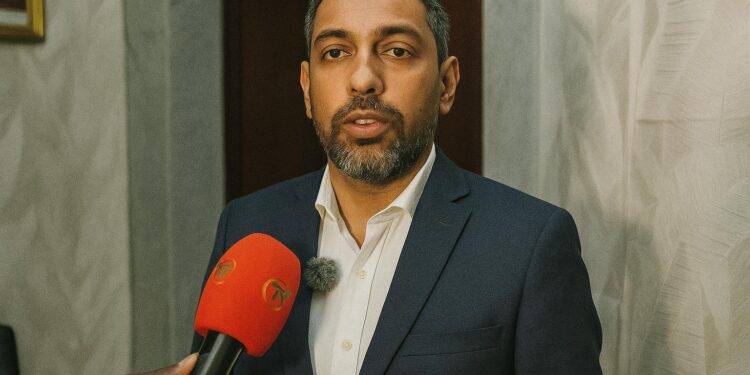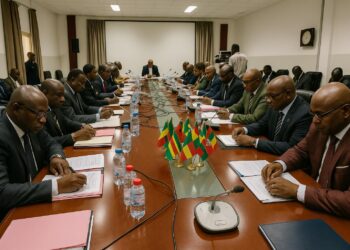An Apology Heard Across Brazzaville
When Dishanti Punjabi, marketing representative of the Regal Group’s Starfood and Parkinshop chains, walked into the Ministry of Urban Sanitation on 7 July, he carried more than a written statement. He brought a symbolic broom, a gesture that resonated across local media outlets and social networks. His apology for failing to sweep the frontage of a single outlet on the first Saturday of the month may seem modest, yet its political overtones were unmistakable. In a city where sanitation campaigns have often collided with commercial interests, the minister’s acceptance of the apology served to reaffirm the government’s zero-tolerance approach while signalling its willingness to engage constructively with the private sector (ACI, 8 July 2023).
Policy over Pedagogy: The Logic Behind the Crackdown
The current operation, officially entitled “Assainissement-déguerpissement”, is the latest phase of a national strategy that dates back to Presidential Decree 2011-173 establishing mandatory monthly cleaning days. According to Minister Juste Désiré Mondélé, the government deliberately shifted in May ‘from pedagogy to coercion’, frustrated by what he termed the ‘persistent non-chalance’ of certain operators, especially expatriate-run retailers (Les Dépêches de Brazzaville, 12 May 2023). The closure of the Starfood outlet therefore functions as a demonstrative sanction, intended to create a ripple effect throughout the commercial community. Diplomatic observers in Brazzaville note that the campaign dovetails with the administration’s larger ambition to present the capital as an attractive logistical hub along the Pointe-Noire-Kinshasa corridor.
Regal Group’s Calculated Compliance Strategy
For the Regal Group, a franchise network of Indian Ocean investors increasingly active in Central Africa, reputational capital is no less valuable than financial capital. Punjabi’s statement that ‘we were reminded, not reprimanded’ reflects a calibrated effort to align the company with state priorities while preserving shareholder confidence. Internal memos seen by regional business analysts indicate that Regal has begun auditing sanitation workflows across its eight outlets, recruited an environmental consultancy based in Johannesburg, and allocated an annual budget line to corporate social responsibility activities centred on urban cleanliness. The group has also hinted at joining the national public-private partnership on waste valorisation, a project co-financed by the African Development Bank, thereby turning a regulatory setback into a branding opportunity.
Investor Optics and the Regulatory Balance
In the medium term, the firmness displayed by Congolese authorities could well enhance, rather than deter, foreign direct investment. Interviews with representatives of the EU commercial section in Brazzaville suggest that predictable enforcement of hygiene norms reduces operational uncertainty and levels the playing field for compliant firms. A Lagos-based risk consultancy points out that many investors weigh public-health governance indicators alongside tax and customs variables. By signalling that non-compliance carries tangible costs, the government improves its credibility in regional competitiveness indices while protecting its population against cholera and vector-borne diseases that sporadically affect the Congo Basin.
Public Reception and the Politics of Cleanliness
On the streets of Poto-Poto market, vendors welcomed the clean-up campaign with a mix of pragmatism and patriotism. ‘Customers linger longer when the gutters are not clogged’, remarked a fish seller interviewed by Télé Congo on 9 July. Civil-society groups have likewise applauded the operation, arguing that sanitation is a public-goods issue transcending partisan divides. Yet they also caution that enforcement must remain even-handed to avoid perceptions of selective punishment. In response, the ministry has announced weekly progress briefings, a move that demonstrates both administrative transparency and an awareness of public sentiment.
A Measured Outlook for Urban Governance
The Regal episode, though minor in financial terms, illuminates the evolving contract between state and market in Congo-Brazzaville. It confirms that President Denis Sassou Nguesso’s government views urban sanitation not merely as a municipal task but as a strategic pillar of national modernisation. If corporate actors internalise the monthly broom ritual as part of their business model, the city stands to gain cleaner streets, and investors gain a regulatory environment where rules are written—and enforced—in plain sight. In that light, Dishanti Punjabi’s apology may mark a turning point in the etiquette of commercial citizenship along the banks of the Congo River.












































